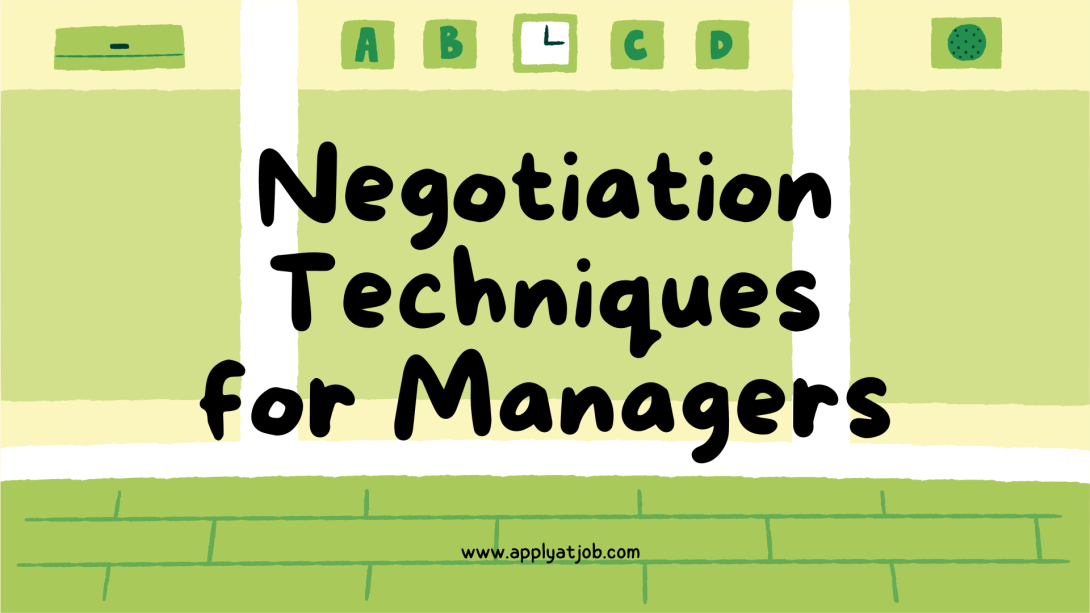
Managerial Negotiation Strategies: Developing Capabilities for Fruitful Results
Whether managing vendor contracts, negotiating budgets, establishing project timetables, or resolving disputes within the team, managers need to be how to negotiate. Clear communication, planning, and the capacity to identify areas of agreement that satisfy all sides are necessary for successful negotiation. Every manager may apply the essential negotiating strategies described in this blog to promote favorable results, establish credibility, and preserve enduring bonds.
1. Get ready Completely
The cornerstone of any effective negotiation is preparation. You will have an edge if you comprehend the problem, know what you want to happen, and are aware of any objections.
Advice on Getting Ready:
. Examine the requirements:, objectives, and constraints of the other side. You can create a proposal that is more enticing if you comprehend their viewpoint.
. Establish your non-negotiables and be clear about your aims. The discussion will stay on topic if you have a clear idea of what you want and where you can be flexible.
. Make a list of possible objections and prepare your responses beforehand.
2. Actively Listen and Show Empathy
Presenting your needs is only one aspect of negotiation; another is comprehending the other party's worries and coming up with win-win solutions. Building rapport and showing respect for the other person's viewpoint are two benefits of active listening.
Active Listening Advice:
. Pay close attention without interjecting. Wait till the other person has finished speaking before answering.
. To demonstrate your understanding, repeat back what you heard. For instance, "If I have this right, you're worried about the timeline." Let's investigate solutions for it.
. To better grasp the other party's position, pay attention to both verbal and nonverbal clues.
3. Make Use of the Power of Inquiries
Posing open-ended questions can help elucidate areas of misunderstanding, uncover motivations, and yield insightful information. In addition to providing you with knowledge, this method makes the other person feel valued and heard.
Advice for Asking Good Questions:
. Pose queries such as "What would make this acceptable for you?" or "Can you tell me more about…"
. Steer clear of yes/no questions as they often terminate the discussion.
. Ask follow-up questions to delve more into important topics or worries.
For instance, a manager may inquire, "What are your top priorities in this partnership?" during contract negotiations. This might lead the conversation in the direction of advantageous terms and reveal hidden priorities.
4. Strive for a Win-Win Result
Creating value for both parties and giving each party the impression that they have earned something worthwhile are the goals of win-win negotiations. This strategy cultivates trust and long-term connections, both of which are critical in any cooperative setting.
Advice on Reaching a Win-Win Situation:
. Determine areas of overlap in interests and common aims.
. Seek innovative ideas that enable both parties to accomplish something significant.
. To achieve progress on goals, be prepared to compromise on less important matters.
In order to demonstrate commitment, a manager negotiating a timetable extension with a customer can, for instance, pledge to produce some project components by the original deadline while requesting a longer timeframe for the more complicated parts.
5. Retain Your Cool and Control Your Emotions
Emotions can run high during negotiations, particularly when delicate subjects like performance or pay are being discussed. It is possible to avoid escalation and maintain the focus of conversations on solutions by being collected and quiet.
Advice for Remaining Calm:
. If you see that you are becoming emotional, stop. You may restore control by slowing down or taking a moment to stand back.
. If you're feeling anxious or irritated, try deep breathing exercises or grounding exercises.
. To preserve a positive environment, speak in a neutral tone and refrain from using offensive words.
6. Use the Best Alternative to a Negotiated Agreement, or BATNA.
You may negotiate from a position of power if you are aware of your Best Alternative to a Negotiated Agreement (BATNA). A strong BATNA enables you to leave without feeling compelled to make a compromise if the terms are unacceptable.
Advice for Applying BATNA:
. Determine your best backup plan in case the talks don't work out. This may entail selecting a different product, collaborating with a different vendor, or modifying the project's scope.
. Avoid placing undue pressure on the other party by being casual about your BATNA, but use it to evaluate any proposals realistically.
In conclusion, becoming an expert negotiator as a manager
One ability that may significantly improve your success as a manager is effective bargaining. You may produce win-win outcomes that improve relationships and provide favorable outcomes by concentrating on planning, attentive listening, and innovative problem-solving. Keep in mind that every negotiation is a chance to establish rapport, demonstrate openness, and come up with ideas that benefit both sides. These strategies can help you approach negotiations with poise and confidence, laying the groundwork for long-term success, whether you're negotiating a vendor contract or talking about team objectives.
You can visit our site: Applyatjob.com
https://applyatjob.com/hiring-employee
https://applyatjob.com/jobs




